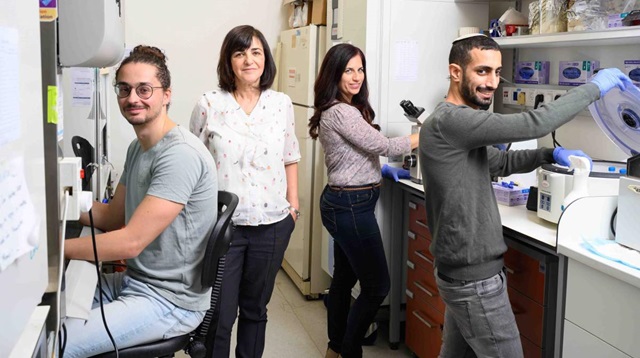
(l-r) Dr. Benjamin Weiss, Prof. Rivka Dikstein, Dr. Anat Bahat and Elad Itzhaki (Weizmann Institute)
Israeli scientists may have found a treatment for Huntington’s disease. Weizmann Institute scientists have discovered two small molecules that can cross the blood-brain barrier in mice, slowing and even reversing the effects of Huntington’s, which is incurable.
In just the past few weeks, Israeli scientists revealed breakthroughs in the treatment of male infertility and even developed a way to grow testicles in a lab. Is there nothing they cannot do?
Huntington’s disease is an inherited neurodegenerative disorder that causes progressive degeneration of nerve cells in the brain, primarily in the basal ganglia. This degeneration leads to a decline in coordination, cognitive function, and emotional stability.
Will you offer us a hand? Every gift, regardless of size, fuels our future.
Your critical contribution enables us to maintain our independence from shareholders or wealthy owners, allowing us to keep up reporting without bias. It means we can continue to make Jewish Business News available to everyone.
You can support us for as little as $1 via PayPal at office@jewishbusinessnews.com.
Thank you.
The main problem in treating Huntington’s is the difficulty in treating the specific part of the brain that the disease damages. The human brain is a well-guarded control center. Its system of blood vessels is surrounded by a densely packed cellular barrier that prevents most substances from getting in or out. This fortified architecture protects the brain, but it can also stop it from getting help when it needs it – for example, in the case of a neurodegenerative disease.
In a new study, published in EMBO Molecular Medicine, Prof. Rivka Dikstein of the Weizmann Institute of Science and her team identified two small molecules that manage to penetrate the blood-brain barrier and reduce the levels of a defective protein that causes Huntington’s disease, an incurable neurodegenerative disorder. The new drugs not only slowed the progress of the disease in mouse models but even reversed some of its symptoms.
The signs and symptoms of Huntington’s disease – slight involuntary movements, general clumsiness and increased anxiety – most commonly emerge around the age of 40. The disease develops over time and inevitably leads to death. It is caused by an excessive repetition, 36 times or more, of a DNA segment in the huntingtin gene. People with Huntington’s usually have one working copy of the huntingtin gene and one defective copy, which leads to the creation of defective proteins that stick together, forming a toxic residue in the brain. This residue accumulates and harms the brain in a number of ways, causing inflammation, thwarting the expression of genes that are vital for the survival of nerve cells and damaging the cellular power stations called the mitochondria.
In the new study, Bahat led a team of researchers who examined 17 molecules with chemical structures similar to those found effective in the previous study, in the hope of identifying the most effective inhibitors of mutant huntingtin expression. Using cell cultures from a mouse model of Huntington’s disease, the researchers identified the two most effective molecules. They then tested the new molecules in cell cultures from human patients with varying degrees of genetic defect, and in every case, identified a significant drop in the amount of the mutant protein. At the same time, there was no decrease in the expression of the nonmutant protein – evidence that the new molecules were doing their job with great precision.
The treatment also managed to alleviate some of the damage caused by the disease. It increased the expression of two genes that are usually harmed the longer the disease progresses: One is a growth factor essential for nerve cell survival, and the other belongs to the mitochondria. “Even though the aged mouse model simulated the disease at an advanced stage,” Bahat explains, “the treatment succeeded in turning back the hands of time to some extent. In behavior studies, we observed reduced levels of anxiety and improved balance and coordination in the treated mice.”
However, administering an infusion directly into the damaged area of the brain requires a complex surgical procedure that is both risky and painful for patients. The researchers therefore sought to establish whether the drug would be effective if given as a pill or via a subcutaneous injection. They were thrilled to discover that these alternative methods were also successful in reducing the levels of mutant huntingtin in the mice’s brains and that the molecules managed to complete the long journey from the mouth or the skin to the brain without undergoing any significant change. Their characteristics allow them to cross the blood-brain barrier and enter the sick area directly once they arrive at their destination.
“We were delighted to find that small molecules managed to reach the brain without undergoing changes and without disintegrating along the way,” Dikstein said. “While other experimental treatments require repeated brain or spinal surgery, these molecules, delivered orally or by means of an injection, could pave the way for an effective and safe treatment of Huntington’s disease. In recent years, it’s become clear that a certain function of large regulatory proteins can be precisely targeted using tiny molecules, without harming the overall functioning of these proteins. This understanding could lay the foundations for new treatments for a variety of diseases.”



